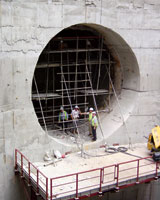 |
| ASIA'S PROMISE Singapore sewer job is lucrative, but follow-up is tough. (Photo courtesy of CH2M Hill) |
The war in Iraq failed to provide much help for a flat non-U.S. environmental remediation market in 2003. Since weapons of mass destruction production were never found, there were no cleanup contracts let for WMD production site remediation. As one observer points out, that may be bad for the White House and a handful of big-Energy Dept. contractors, but its good news for the rest of us.
After President Bush declared the end of hostilities in May 2003, many hoped to see an aggressive reconstruction ramp-up, funded jointly by U.S. and Iraqi money. But more than a years worth of rising insurgency has slowed rebuilding. U.S. contractors that signed on for work under more than $18 billion in U.S. supplemental funding grouse that task orders have slowed to a trickle.
Car bombings, kidnapings and ambushes made a shambles of Coalition goals for infrastructure repairs in the oil, power and water/wastewater treatment sectors. The only timetable accelerated was the transfer of sovereignty from the Coalition to the interim Iraqi government. It occurred June 28, two days ahead of schedule.
In some ways, Iraq presents a metaphor for the overall picture for non-U.S. environmental work in 2003. More money was spent there than in the year before, with little good to show for it. Markets may deal with the reality of war better than uncertainty beforehand. Middle East revenue is a case in point. It includes work in Iraq and rebounded nicely in 2003, gaining 28% to hit $334.9 million.
Work in the region propelled Ecology and Environment Inc.s climb up the ranks to No. 47, up 10 spots from the year before. "Most of our work is in Saudi Arabia and Kuwait," says Ronald L. Frank, chief financial officer of the firm.
Perhaps more than in other regions, relationships in the Middle East are important and must be nurtured over time. "Weve been there since the 1980s,"
says Frank. The company achieved a foothold working on the Yanbu petrochemical complex in Saudi Arabia. A United Nations-funded environmental health-effects study helped the company boost its Middle East share of overall revenue from 15% to 26% in 2003.
Like others, however, Ecology and Environment has been affected by a wave of anti-Americanism in recent years. The company is paying more attention to security than in the past. Terrorist gunmen attacked the Yanbu foreign workers complex in May, killing five contractors (ENR 5/10 p. 15). "We have about 30 people living in a fortified compound and thats all Im going to say," says Frank.
Elsewhere, Europe rebounded slightly, adding $99 million to the regional revenue total, a 6% gain. Business picked up 44% in Australia and New Zealand, but slipped 22% in Asia and Canada, 31% in Latin America and remained fairly flat in Africa. Overall, international environmental revenue totaled $4 billion, a 2.75% gain over 2002.
|
"The war in Iraq created uncertainty in the global economy," says John Deal, CEO of The ERM Group. "A year later, I still see the market as flat. Confidence has improved, but only slightly."
Looking forward, some see Europe as the most likely place to add to business in the near-term. Along with Bechtel Nationals Craig Weaver, Ken Smith, senior vice president of Fluors Greenville, S.C.-based government group, is excited about the emerging market in the U.K. "Theyve created an entity in the U.K. government to manage that and they will look [for] strategies to clean up their sites," he says.
Fluor, in joint venture with AMEC, also is maintaining a significant presence in Iraqi reconstruction, with well over $1 billion worth of task orders through the U.S. Project Contracting Office, Smith says. Work ranges from power to water and public works.
Thomas Searle, president of CH2M Hills water group, says anti-American sentiment has dampened prospects somewhat in the Latin American market. The numbers...
